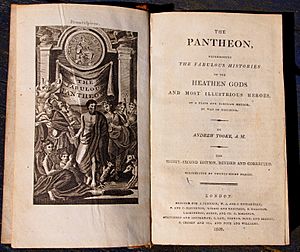Andrew Tooke facts for kids
Andrew Tooke (born 1673, died 1732) was an important English scholar. He was the headmaster of Charterhouse School, a professor at Gresham College, and a member of the Royal Society. He is best known for translating Tooke's Pantheon, a very popular textbook about Greek mythology that was used for about a hundred years.
Contents
Andrew Tooke's Life
Andrew Tooke was born in 1673. He was the second son of Benjamin Tooke, who was a stationer in London. A stationer was someone who sold paper and books. Andrew went to school at Charterhouse, which was a famous school.
Education and Early Career
In 1690, Andrew became a student at Clare Hall, Cambridge. He earned his first degree (B.A.) in 1693 and his master's degree (M.A.) in 1697.
In 1695, he started working as an usher at Charterhouse school. An usher was like an assistant teacher. On July 5, 1704, he was chosen to be the professor of geometry at Gresham College. He took over this role from Robert Hooke, a very famous scientist.
Royal Society and Later Years
Andrew Tooke became a member of the Royal Society on November 30, 1704. The Royal Society is a group of important scientists. They even held their meetings in his rooms at Gresham College for a few years.
On July 17, 1728, he became the master of Charterhouse, which means he was the headmaster of the school. He had also become a deacon in the church, which is a type of religious leader. Sometimes he would preach, but he mostly focused on teaching and education.
He stopped being a professor at Gresham College on June 26, 1729. Andrew Tooke passed away on January 20, 1732. He was buried in the chapel at Charterhouse, and a monument was put there to remember him. In May 1729, he married the widow of Dr. Henry Levett, who was a doctor for Charterhouse.
Andrew Tooke's Works
Andrew Tooke wrote and translated several important books during his life.
Here are some of his most well-known works:
- The Pantheon: This was his most famous work. It was a translation of a book by a Jesuit priest named François Antoine Pomey. The book explained the stories of the Greek and Roman gods and heroes. It was first published in 1698 and became a standard textbook for many years, with over 35 editions!
- Synopsis Graecae Linguae: This book, published in 1711, was about the Greek language.
- The Whole Duty of Man, according to the Law of Nature: This was a translation of a book by Samuel von Pufendorf from Latin into English. It was about how people should behave based on natural laws.
- Institutiones Christianae: Published in 1718, this was a translation of a book by Francis Gastrell about Christian teachings.
- Ovid's Fasti: He edited an edition of this classical Roman poem by Ovid in 1720.
- Treatise of English Particles: He also edited a book by William Walker about English grammar in 1720.
- Copy of the last Will and Testament of Sir Thomas Gresham: This anonymous book from 1724 included some of his writings about Gresham College.
- Epistles in Pliny's Epistles: He contributed letters to an English edition of Pliny's 'Epistles' in 1724.
 | James B. Knighten |
 | Azellia White |
 | Willa Brown |


